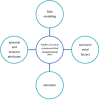The role of hidden curriculum in the formation of professional ethics in Iranian medical students: A qualitative study
- PMID: 32953908
- PMCID: PMC7482700
- DOI: 10.4103/jehp.jehp_172_20
The role of hidden curriculum in the formation of professional ethics in Iranian medical students: A qualitative study
Abstract
Introduction: Professionalism and medical ethics are a vital quality for doctors, which has been taken into account seriously in recent years. Perception of the factors affecting professionalism may help develop more efficient approaches to promote this quality in medical education. This study was aimed to explain the role of hidden curriculum in the formation of professional ethics in Iranian medical students.
Materials and methods: This qualitative study was performed on 15 medical interns of Kermanshah University of Medical Sciences in 2019, using grounded theory. Sampling was started by purposive sampling and continued through theoretical sampling until complete data saturation. Data collection and analysis were done simultaneously. Data were interpreted by a constant comparative method according to Strauss and Corbin's approach.
Results: The analysis of the participants' interviews and reduction of findings using common themes yielded one class and four categories as well as a number of concepts as the role of hidden curriculum in the formation of professional ethics in medical students. The categories included the role of modeling in the formation of professional ethics, role of education in the formation of professional ethics, role of environmental factors in the formation of professional ethics, and role of personal and inherent attributes in the formation of professional ethics.
Conclusion: Curriculum developers and medical education authorities need to proceed in line with the findings of the present study to provide a proper learning environment, in which the modeling, learning, and teaching conditions and supportive environmental atmosphere are taken into account in accordance with the inherent and individual characteristics of the learners in order to guarantee the formation of professional ethics in medical students.
Keywords: Curriculum; medical education; professional ethics; professionalism.
Copyright: © 2020 Journal of Education and Health Promotion.
Conflict of interest statement
There are no conflicts of interest.
Figures
Similar articles
-
The Hidden Curriculum Challenges in Learning Professional Ethics Among Iranian Medical Students: A Qualitative Study.Adv Med Educ Pract. 2020 Sep 24;11:673-681. doi: 10.2147/AMEP.S258723. eCollection 2020. Adv Med Educ Pract. 2020. PMID: 33061738 Free PMC article.
-
Learning professionalism through hidden curriculum: Iranian medical students' perspective.J Med Ethics Hist Med. 2018 Sep 9;11:10. eCollection 2018. J Med Ethics Hist Med. 2018. PMID: 31346387 Free PMC article.
-
A situation analysis of inter-professional education and practice for ethics and professionalism training at Makerere University College of Health Sciences.BMC Res Notes. 2015 Oct 23;8:598. doi: 10.1186/s13104-015-1577-y. BMC Res Notes. 2015. PMID: 26498749 Free PMC article.
-
The hidden curriculum, ethics teaching, and the structure of medical education.Acad Med. 1994 Nov;69(11):861-71. doi: 10.1097/00001888-199411000-00001. Acad Med. 1994. PMID: 7945681 Review.
-
Medical ethics education: where are we? Where should we be going? A review.Acad Med. 2005 Dec;80(12):1143-52. doi: 10.1097/00001888-200512000-00020. Acad Med. 2005. PMID: 16306292 Review.
Cited by
-
Investigating the relationship between the ethical atmosphere of the hospital and the ethical behavior of Iranian nurses.J Educ Health Promot. 2021 May 31;10(1):193. doi: 10.4103/jehp.jehp_891_20. eCollection 2021. J Educ Health Promot. 2021. PMID: 34250127 Free PMC article.
-
Differences in moral reasoning among medical graduates, graduates with other degrees, and nonprofessional adults.BMC Med Educ. 2022 Jul 23;22(1):568. doi: 10.1186/s12909-022-03624-z. BMC Med Educ. 2022. PMID: 35870920 Free PMC article.
References
-
- Hafferty FW, O’ Donnell JW. The hidden curriculum in health professional education. Hanover, NH: Dartmouth College Press; 2014. ISBN: 978-1-61168-659-6.
-
- Dunn M. On the relationship between medical ethics and medical professionalism. J Med Ethics. 2016;42:625–6. - PubMed
-
- Maxwell B, Schwimmer M. Professional ethics education for future teachers: A narrative review of the scholarly writings. J Moral Educ. 2016;45:354–71.
-
- Sulaimani MF, Gut DM. Hidden curriculum in a special education context: The case of individuals with autism. J Educ Res Pract. 2019;9:1–6.
LinkOut - more resources
Full Text Sources


